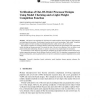Free Online Productivity Tools
i2Speak
i2Symbol
i2OCR
iTex2Img
iWeb2Print
iWeb2Shot
i2Type
iPdf2Split
iPdf2Merge
i2Bopomofo
i2Arabic
i2Style
i2Image
i2PDF
iLatex2Rtf
Sci2ools
144
Voted
FMSD
2002
2002
Verification of Out-Of-Order Processor Designs Using Model Checking and a Light-Weight Completion Function
We present a new technique for verification of complex hardware devices that allows both generality andahighdegreeofautomation.Thetechniqueisbasedonournewwayofconstructinga"light-weight"completion function together with new encoding of uninterpreted functions called reference file representation. Our technique combines our completion function method and reference file representation with compositional model checking and theorem proving. This extends the state of the art in two directions. First, we obtain a more general verification methodology. Second, it is easier to use, since it has a higher degree of automation. As a benchmark, we take Tomasulo's algorithm for scheduling out-of-order instruction execution used in many modern superscalar processors like the Pentium-II and the PowerPC 604. The algorithm is parameterized by the processor configuration, and our approach allows us to prove its correctness in general, independent of any actual design.
Related Content
| Added | 19 Dec 2010 |
| Updated | 19 Dec 2010 |
| Type | Journal |
| Year | 2002 |
| Where | FMSD |
| Authors | Sergey Berezin, Edmund M. Clarke, Armin Biere, Yunshan Zhu |
Comments (0)

